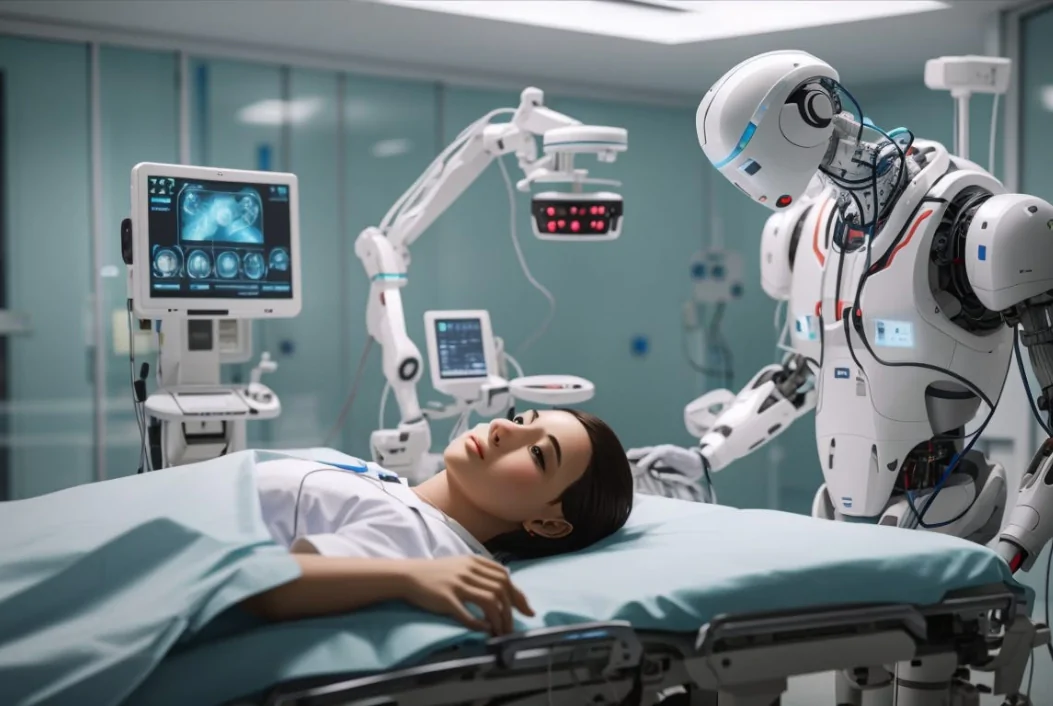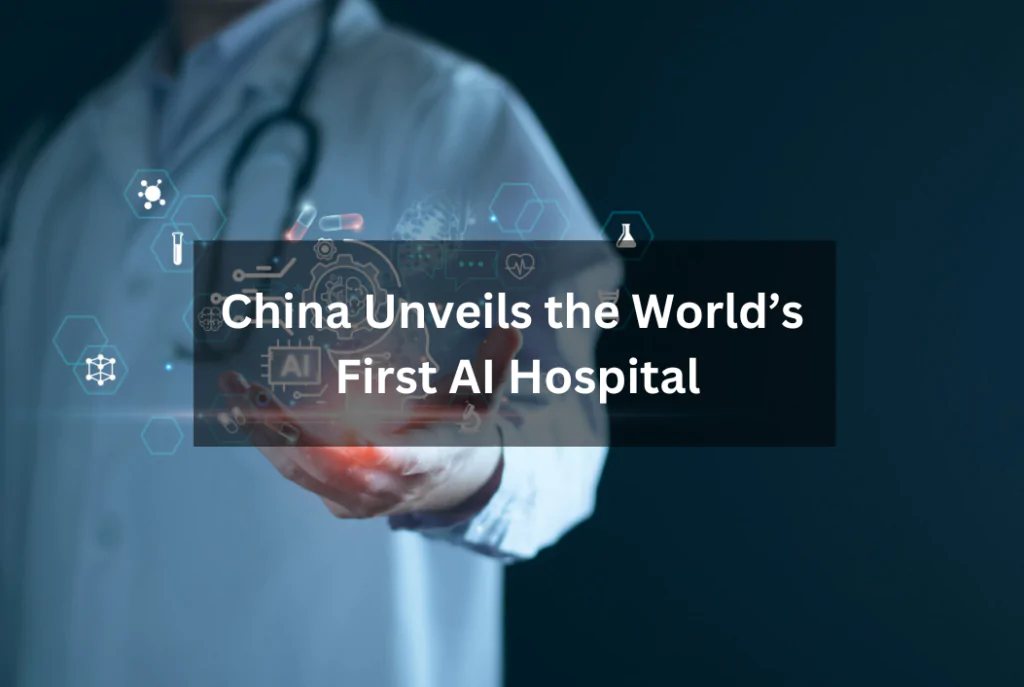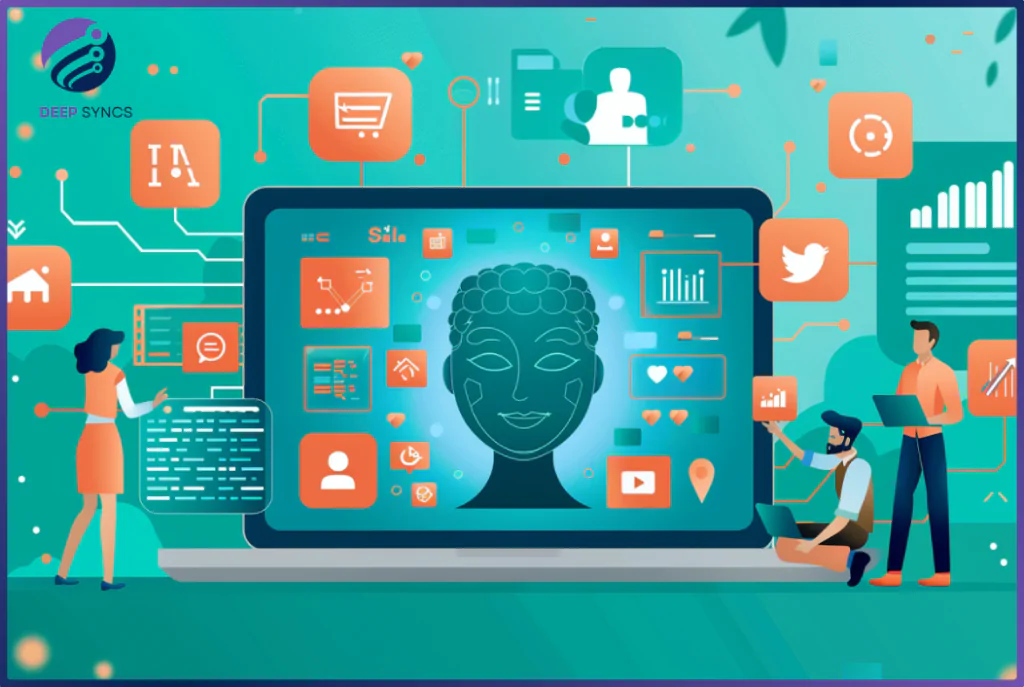In a groundbreaking move set to transform the landscape of healthcare, China has introduced the world’s first artificial intelligence, AI hospital. Named “Agent Hospital,” this revolutionary virtual facility boasts an impressive lineup of 14 AI doctors and four nurses, all designed to provide unprecedented levels of medical care and efficiency.

A Leap Towards the Future
The establishment of Agent Hospital marks a significant milestone in the integration of AI technology within the medical field. Unveiled by researchers from Tsinghua University in Beijing, the AI-driven hospital aims to revolutionize conventional healthcare systems globally and promises to save millions of lives by making healthcare more accessible and efficient.
Unmatched Efficiency and Accuracy
One of the most striking features of Agent Hospital is its ability to handle an extraordinary volume of patients. In just a few days, the AI physicians at this virtual hospital can attend to up to 10,000 patients. For context, it would take a human doctor at least two years to reach the same number of consultations. This remarkable efficiency is poised to significantly reduce waiting times and improve access to medical care for patients around the world.
Before the inauguration, the AI doctors underwent rigorous testing based on the US Medical License Exam questions, achieving an astounding accuracy rate of 93.06%. This level of precision not only underscores the reliability of AI in healthcare but also builds trust in its potential to complement human doctors.
Enhancing Medical Training and Predictive Capabilities
The implementation of Agent Hospital is set to begin with medical universities, where the AI program will assist in training future doctors. By leveraging AI, medical students will have access to advanced diagnostic tools and simulated patient interactions, enriching their learning experience and preparing them for real-life medical scenarios.
Beyond education, the AI hospital is expected to be integrated into hospitals across China, offering patients direct access to AI-driven medical consultations. Liu Yang, the leader of the research team behind Agent Hospital, believes that the AI doctors will not only provide immediate healthcare solutions but also predict and simulate medical scenarios, such as potential pandemic outbreaks. This predictive capability could prove invaluable in preempting and managing future health crises.
Transforming Patient-Doctor Interactions
At the core of Agent Hospital’s mission is the transformation of patient-doctor interactions. By utilizing AI, the hospital aims to make healthcare more accessible and streamline medical procedures. Patients can engage with AI doctors for initial consultations, receive timely diagnoses, and even get recommendations for treatment plans. This approach not only enhances patient experience but also frees up human doctors to focus on more complex and critical cases.

AI Hospitals: The Next Frontier in Healthcare
The concept of AI hospitals is not limited to Agent Hospital in China. Around the world, researchers and medical professionals are exploring the potential of AI to revolutionize healthcare delivery. AI hospitals could address numerous challenges faced by traditional healthcare systems, including:
Reducing Healthcare Costs
AI hospitals have the potential to significantly reduce healthcare costs by automating routine tasks and streamlining operations. This can lead to more efficient resource utilization and lower operational expenses.
Enhancing Diagnostic Accuracy
With their ability to analyze vast amounts of medical data quickly and accurately, AI systems can improve diagnostic accuracy and reduce the incidence of misdiagnoses. This can lead to better patient outcomes and more effective treatments.
Addressing Workforce Shortages
Many countries face a shortage of healthcare professionals. AI hospitals can alleviate this issue by providing automated support for routine medical tasks, allowing human doctors to focus on more complex and critical cases.
Improving Patient Access
AI hospitals can provide remote consultations and telemedicine services, making healthcare more accessible to people in rural or underserved areas. This can help bridge the gap in healthcare disparities and ensure that more people receive timely medical attention.
Operational by 2024
As per reports, Agent Hospital is expected to be fully operational by the end of 2024. The initial phase will involve collaboration with medical universities, followed by a gradual rollout to hospitals across China. This phased approach ensures that the AI systems are thoroughly tested and optimized before being introduced to a wider patient base.

The Dawn of a New Era in Healthcare
The unveiling of Agent Hospital signifies the dawn of a new era in healthcare, where AI technology plays a central role in delivering medical care. With its ability to handle large volumes of patients, high accuracy rates, and predictive capabilities, Agent Hospital is poised to revolutionize the way we approach healthcare. As this innovative model gains traction, it holds the promise of making quality healthcare more accessible to people worldwide, ultimately saving lives and improving global health outcomes.
China’s bold step in unveiling the world’s first AI hospital sets a precedent for other nations to explore and invest in AI-driven healthcare solutions. As we move towards a future where technology and medicine are increasingly intertwined, the potential for AI to enhance human health and well-being is boundless.
Contribution of AI in Healthcare
Addressing Ethical and Privacy Concerns in AI-Driven Healthcare
Navigating the Ethical Landscape
The integration of AI into healthcare, as demonstrated by Agent Hospital, brings with it significant ethical considerations. Ensuring that AI doctors adhere to ethical standards and provide unbiased medical care is paramount. Developers and healthcare providers must work together to create guidelines and protocols that address issues such as patient consent, data security, and the transparency of AI decision-making processes.
Safeguarding Patient Privacy
With the use of AI in healthcare, safeguarding patient privacy becomes increasingly critical. Agent Hospital must implement robust data protection measures to ensure that patient information is securely stored and handled. Compliance with data privacy regulations and the development of secure systems to prevent unauthorized access are essential to maintaining patient trust and the integrity of the healthcare system.
Adding this heading and section to the blog will provide a more comprehensive overview of the potential challenges and considerations associated with AI hospitals, highlighting the importance of ethical and privacy standards in the successful implementation of AI-driven healthcare solutions.
Conclusion
The launch of Agent Hospital represents a transformative development in the field of healthcare. By harnessing the power of AI, this virtual hospital is set to improve efficiency, accuracy, and accessibility in medical care. As the world watches China lead the way in this innovative approach, other nations are likely to follow suit, integrating AI technology into their healthcare systems. The future of medicine is here, and it promises to bring profound changes that will benefit millions of people around the globe.
FAQ
What is Agent Hospital?
Agent Hospital is the world’s first artificial intelligence (AI) hospital, established by researchers from Tsinghua University in Beijing, China. It is a virtual facility equipped with 14 AI doctors and four nurses, designed to provide efficient and accessible healthcare.
What are the capabilities of the AI doctors at Agent Hospital?
The AI doctors at Agent Hospital can handle a large volume of patients, up to 10,000 in just a few days. They have been tested based on the US Medical License Exam questions, achieving an accuracy rate of 93.06%. These AI doctors can perform initial consultations, provide diagnoses, and recommend treatment plans.
How will Agent Hospital impact conventional healthcare?
Agent Hospital is set to revolutionize healthcare by making it more accessible and efficient. The AI doctors can handle more patients in a shorter amount of time compared to human doctors, reducing waiting times and improving access to medical care. It will also allow human doctors to focus on more complex and critical cases.
When will Agent Hospital be fully operational?
Agent Hospital is expected to be fully operational by the end of 2024. The initial phase will involve collaboration with medical universities for training purposes, followed by a gradual rollout to hospitals across China.
How will Agent Hospital assist in medical education?
Agent Hospital will be integrated into medical universities first to help train future doctors. The AI program will provide advanced diagnostic tools and simulated patient interactions, enriching the learning experience and better preparing students for real-life medical scenarios.
What are the predictive capabilities of Agent Hospital?
Agent Hospital’s AI doctors can predict and simulate medical scenarios, such as potential pandemic outbreaks. This predictive capability could be crucial in preempting and managing future health crises.
What are the potential benefits of AI hospitals?
AI hospitals can significantly reduce healthcare costs by automating routine tasks, enhance diagnostic accuracy, address workforce shortages, and improve patient access to medical care. They provide remote consultations and telemedicine services, making healthcare more accessible to people in rural or underserved areas.
How does Agent Hospital transform patient-doctor interactions?
Agent Hospital aims to make healthcare more accessible and streamline medical procedures. Patients can engage with AI doctors for initial consultations, receive timely diagnoses, and get treatment recommendations. This approach enhances patient experience and allows human doctors to focus on more critical cases.
Will AI hospitals replace human doctors?
AI hospitals are designed to complement, not replace, human doctors. They handle routine tasks and consultations, allowing human doctors to concentrate on more complex medical issues. AI doctors provide support and efficiency, enhancing the overall healthcare system.
How does Agent Hospital ensure the accuracy of AI doctors?
Before the inauguration, the AI doctors were tested based on the US Medical License Exam questions, achieving a high accuracy rate of 93.06%. This rigorous testing ensures the reliability and precision of the AI doctors in providing medical care.
What are the future plans for AI hospitals like Agent Hospital?
The initial implementation of Agent Hospital will focus on medical universities, followed by a wider rollout to hospitals across China. As the technology proves its effectiveness, AI hospitals may become more common globally, transforming healthcare systems and improving access to medical care worldwide.


